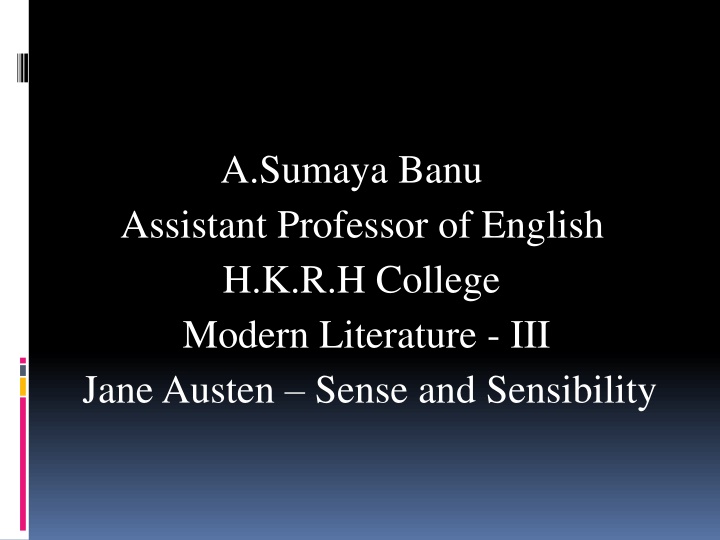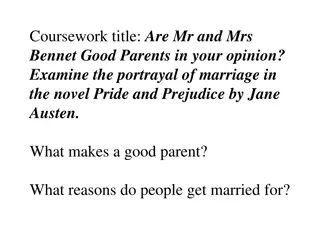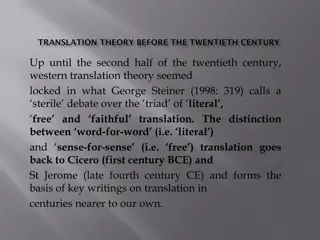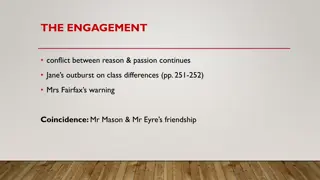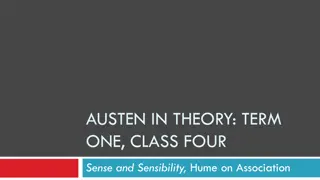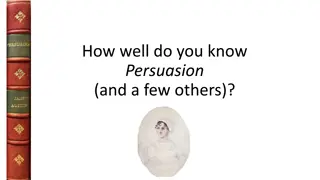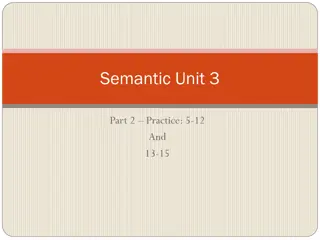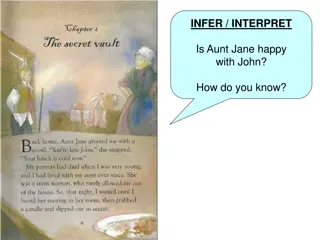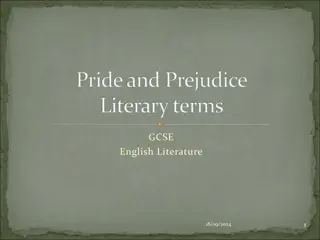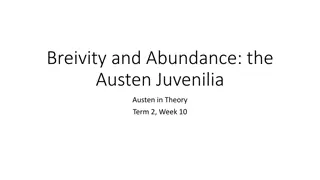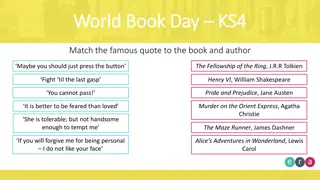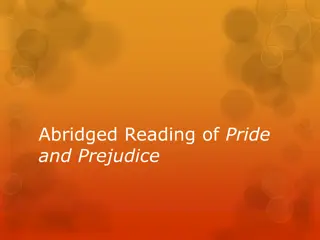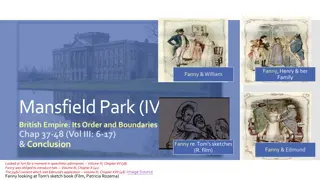Insights into Jane Austen's Sense and Sensibility
Jane Austen, an English novelist, delves into the themes of marriage, social standing, and economic security in her works, notably in "Sense and Sensibility". The novel follows the lives of the Dashwood sisters, Elinor and Marianne, exploring the contrast between sense and sensibility. With her biting irony, realism, and social commentary, Austen's writings have garnered acclaim from critics and readers alike.
Download Presentation

Please find below an Image/Link to download the presentation.
The content on the website is provided AS IS for your information and personal use only. It may not be sold, licensed, or shared on other websites without obtaining consent from the author.If you encounter any issues during the download, it is possible that the publisher has removed the file from their server.
You are allowed to download the files provided on this website for personal or commercial use, subject to the condition that they are used lawfully. All files are the property of their respective owners.
The content on the website is provided AS IS for your information and personal use only. It may not be sold, licensed, or shared on other websites without obtaining consent from the author.
E N D
Presentation Transcript
A.Sumaya Banu Assistant Professor of English H.K.R.H College Modern Literature - III Jane Austen Sense and Sensibility
SENSE AND SENSEBILITY SENSE AND SENSEBILITY JANE AUSTEN JANE AUSTEN
Introduction about Author Jane Austen was born on 18 December 1775 and died in 18 July 1817 She was an English Novelist Plot often explore the dependence of women on marriage in the pursuit of favorable social standing and economic security. Her works critique the novel of sensibility of the second half of the 18 th century and are part of the transition to 19 th century literary realism Her use of biting irony, along with her realism, humor and social commentary, have long earned her acclaim among critics, scholars and popular audience alike.
Famous Novels Sense and Sensibility (1811) Pride and Prejudice (1813) Mansfield park (1814) Emma (1815) Northanger Abbey (1818) Persuasion (1818)
Introduction about novel: Sense and Sensibility Jane Austen s first novel Romantic fiction The Dashwood sisters central characters Novel divided into three volumes Story of Dashwood sisters sense and sensibility Novel main focus on the lives of Elinor amd Marianne Theme of Marriage
Character Sketch Colonel Brandon -A retired officer and friend of Sir John Middleton who falls in love with Marianne Dashwood and acts kindly, honorably, and graciously towards the Dashwoods throughout the novel Mrs. Dashwood - The kind and loving mother of Elinor, Marianne, and Margaret and second wife to Henry Dashwood. She has inherited no fortune of her own but wants the best for her daughters and shares Marianne's romantic sensibilities. Elinor Dashwood - The nineteen-year-old eldest daughter of Mr. and Mrs. Henry Dashwood and the heroine of Austen's novel. Elinor is composed but affectionate, both when she falls in love with Edward Ferrars and when she comforts and supports her younger sister Marianne.
Henry Dashwood - The father of John Dashwood and, by a second marriage, of Elinor, Marianne, and Margaret Dashwood. He dies in the opening chapter of the novel and bequeaths his estate at Norland to his son, leaving his wife and daughters impoverished Fanny Dashwood - The selfish, snobbish, and manipulative wife of John Dashwood and the sister of Edward and Robert Ferrars. John Dashwood - The weak-minded and money- grubbing heir to the Norland estate. At his wife Fanny's suggestion, he leaves his mother and sisters with very little money and remains largely unconcerned for their welfare.
Margaret Dashwood - The thirteen-year-old, good- humored youngest daughter of Mr. and Mrs. Henry Dashwood, Margaret shares her sister Marianne's romantic tendencies. Marianne Dashwood - The seventeen-year-old second daughter of Mr. and Mrs. Henry Dashwood. Marianne's spontaneity, excessive sensibility, and romantic idealism lead her to fall in love with the debaucherous John Willoughby, though he painfully spurns her, causing her to finally recognize her misjudgment of him. After this turn of heart, she ultimately marries her long-standing admirer, Colonel Brandon. Mrs. Ferrars - The wealthy, manipulative mother of Edward and Robert who disinherits her first son when he refuses to marry a rich heiress.
Edward Ferrars - The sensible and friendly older brother of Fanny Dashwood and Robert Ferrars. Edward develops a close relationship with Elinor while staying at Norland and ultimately marries her, after he is freed from a four- year secret engagement to Lucy Steele. Robert Ferrars -A conceited coxcomb and the younger brother of Edward and Fanny. Robert inherits his mother's fortune after she disinherits Edward. Ironically, he ultimately marries Lucy Steele, even though it was Edward's engagement to this same woman that caused his mother to disinherit him. Miss Sophia Grey - The wealthy heiress whom Willoughby marries after abandoning Marianne. Mrs. Jennings - Lady Middleton's gossipy but well- intentioned mother who invites the Dashwood sisters to stay with her in London and makes it her "project" to marry them off as soon as possible.
Lady Middleton -A distant relation of the Dashwoods who lives at Barton Cottage with her husband Sir John Middleton and their four spoiled children Sir John Middleton - The jovial but vulgar distant relation of the Dashwoods who invites Mrs. Dashwood and her three daughters to stay at Barton Cottage after Mr. and Mrs. John Dashwood inherit Norland, leaving the women homeless. Mr. Thomas Palmer - Mrs. Palmer's gruff, unemotional husband. Mrs. Charlotte Palmer - Mrs. Jennings' talkative and foolish daughter who invites the Dashwood sisters to stay at her home in Cleveland on their way from London to Barton. Anne Steele - Lucy Steele's older, unmarried sister who accidentally reveals her sister's secret engagement to Edward Ferrars.
Lucy Steele - Mrs. Jennings' cousin and a sly, selfish, and insecure young woman. She has been secretly engaged to Edward Ferrars for four years but she ultimately marries his brother, Robert, once Edward is disinherited. John Willoughby -An attractive but deceitful young man who wins Marianne Dashwood's heart but then abandons her (greedily) in favor of the wealthy Miss Sophia Grey.
